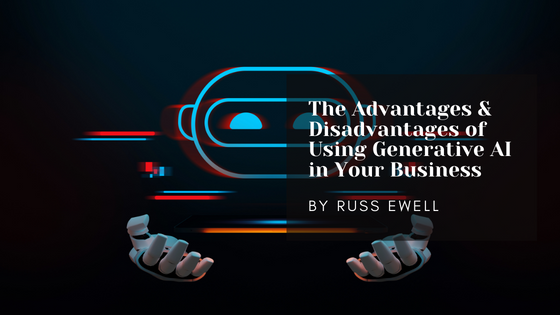In recent years, generative artificial intelligence (AI) has emerged as a powerful tool with the potential to revolutionize numerous industries. Generative AI is a subset of AI that uses machine learning algorithms to generate new, original content such as images, text, or music. While it offers exciting possibilities for businesses, it’s essential to weigh its advantages against its disadvantages. It will be beneficial to look at the pros and cons of using generative AI in your business, which can help you make an informed decision about its integration.
Advantages of Generative AI:
- Enhanced Creativity: Generative AI can generate new and original content, enabling businesses to explore innovative ideas and creative solutions. For example, it can be used to design unique logos, generate product ideas, or create personalized marketing materials that resonate with customers.
- Time and Cost Efficiency: With generative AI, businesses can automate various tasks that would otherwise require significant time and resources. For instance, it can streamline content generation, reducing the need for manual creation. This can save both time and costs, allowing employees to focus on higher-value activities.
- Personalization and Customer Experience: Generative AI can analyze vast amounts of data to understand customer preferences and behaviors, enabling businesses to personalize their products or services. This can lead to improved customer experiences, higher customer satisfaction, and increased loyalty.
- Predictive Analytics: Generative AI can provide valuable insights and make accurate predictions by analyzing historical data. This can help businesses optimize their strategies, identify trends, forecast demand, and make data-driven decisions, improving overall operational efficiency and competitiveness.
Disadvantages of Generative AI:
- Ethical Concerns: Generative AI raises ethical questions related to intellectual property, privacy, and misinformation. Generated content can infringe on copyrights, and malicious use can create and disseminate fake news, deep fakes, or deceptive information. Businesses must navigate these challenges carefully.
- Data Quality and Bias: Generative AI models heavily rely on the quality and diversity of training data. If the data is biased or incomplete, the generated content may reflect those biases, perpetuating discrimination or misinformation. Businesses must ensure the integrity and representativeness of their training datasets.
- Lack of Control: While generative AI offers creative possibilities, it also poses challenges in maintaining control over the generated content. The AI model may produce unexpected or undesirable outputs, requiring human intervention for verification and refinement.
- Skill Requirement and Integration Complexity: Integrating generative AI into a business requires specialized knowledge and expertise. Training and maintaining AI models, implementing necessary infrastructure, and ensuring data security can be complex and resource-intensive tasks.
Generative AI presents exciting opportunities for businesses, enhancing creativity, efficiency, personalization, and predictive analytics. However, things like ethical concerns, data quality issues, lack of control, and integration complexity must be carefully considered. By leveraging its advantages while addressing its drawbacks, businesses can harness the transformative potential of generative AI effectively.

